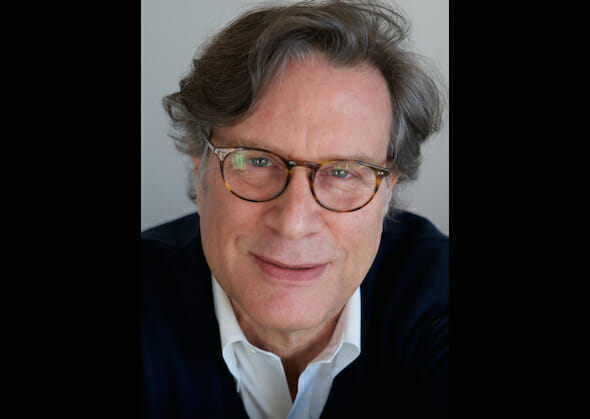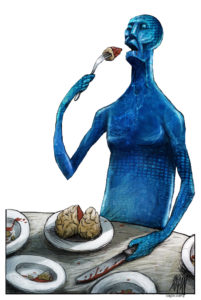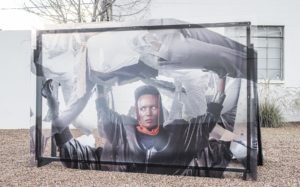Danny Goldberg on Channeling the Idealism of the Summer of Love (Audio)
Truthdig Editor Robert Scheer and the music industry veteran discuss the political impact of psychedelic music in the ’60s. Danny Goldberg. (Photo courtesy of Peter Cunningham)
Danny Goldberg. (Photo courtesy of Peter Cunningham)
RS: Hi, this is Robert Scheer with another edition of Scheer Intelligence, where the intelligence comes from my guests. In this case, Danny Goldberg, a legend in the music industry who’s just written yet another book. You’ve done about five, I think–
DG: It’s my third that I’ve written, and I edited a couple as well.
RS: –you’ve edited others. And it’s a really interesting book. It’s on the occasion of the 50th anniversary of the Summer of Love in San Francisco. And the title is “In Search of the [Lost] Chord: 1967 and the Hippie Idea.” It’s at Akashic Books. And we can begin with that. Akashic Books is one of those great but struggling smaller press[es]. It was actually founded by a musician–
DG: Yeah, Johnny Temple.
RS: Johnny Temple. Did you represent him, or is he someone–
DG: No, no, I never represented him. He was in a band called Girls Against Boys that I never worked with, but we got to be friends after, after the band broke up, when he started this company, you know. And I’ve always admired what he does, you know. We need more independent publishers.
RS: Yeah. And it’s interesting, he knew, he had one good contract, he told me, and he took the money and started, of all things, a book publishing operation. And then, you know, you’ve written this book that I think is a very good retelling of the spirit of that time. And for those who don’t remember it [Laughs]–what was the old slogan, if you were, if you remember it, you weren’t there?
DG: Yeah, I quote that. And no one even is sure who said it. It’s attributed variously to David Crosby, Robin Williams, and Paul Kantner. So maybe they all said it.
RS: Well, the fact of the matter is, I was there, and you weren’t. [Laughs]
DG: I was in high school. I was in the front row watching you and everybody else on the stage of the culture.
RS: I was there, and I do, I think you certainly capture the variety, the scope, the optimism, and the joyfulness of it. There’s no question. So let’s get right to the heart of the book. What’s the last chord? Why were you searching for it? And “1967 and the Hippie Idea,” what is the hippie idea?
DG: Well, I have to say, it’s actually in search of the “lost” chord. And that’s a, it’s — I copped the title from a Moody Blues song, but they were referencing an old 19th century song. And to me, I like the idea of the lost chord, because to me, the sixties were — ’67 in particular, there was a combination of forces where the whole was greater than the sum of the parts, for me as a kid, as a teenager. And I feel it got darker as early as ‘68, when Dr. King and Robert Kennedy were killed, and there was the police riots at the Democratic Convention, and heroin and methedrine, you know, went into neighborhoods where previously it was pot and psychedelics. But in ‘67, to me, there was a balance between political protest, black power, the popularization of psychedelics — because it was the first full year when LSD was illegal, which of course made it much easier to get — and an interest in Eastern spirituality, which had previously kind of been the providence of academia and small, bohemian enclaves, was on the mass pop culture screen, primarily because of the Beatles. And a music scene really exploded that year. It was the year that a number of artists made their debut albums, including Jimi Hendrix, Janis Joplin, the Grateful Dead, the Doors, Sly and the Family Stone, the Velvet Underground, and Pink Floyd. All made their debut albums the same year. And the combination of these things, as well as this tremendous sense of connectivity of young people, before the cynicism and the exploitation came in, created this very idealistic feeling. A lot of people referred to the Greek word, agape, of universal love. There was a feeling that you just could see someone down the street, and feel an immediate brotherhood. And that feeling quickly went away. It didn’t change the world overnight. But it left the residue for a lot of us, and I wanted to try to document what happened. Because most of the histories of the sixties focus so much on protest that it doesn’t include the full kind of menu of things that were happening. So that’s, I coined “the lost chord” as a shorthand for that.
RS: OK. But it has a notion of, ah, selling out of integrity, of the desirable life. And you sort of picture it as if there was this wonderful moment where sort of the tribes came together. And reading your book, there’s this great deal of detail and description of how it was done, and so forth. And I’ll accept, having read your book, I’ll accept there was that moment, and there certainly was an optimism. Some would say a naivete. But the other theme that ran right through the sixties, and even earlier in San Francisco with the Beats and everything, was the notion that the society will put tremendous pressure on you to sell out. And what you want to do is avoid selling out. You want to stand for something. So you mention Mario Savio over in Berkeley, and the free speech movement. That’s what Mario Savio was all about. A guy with a very good grade average, and obviously a good student, saying: I’m — not I’m going to drop out — I’m not going to accept what the system is requiring. I’m not going to be the IBM card that you can read. I’m going to be an independent human being. And you found that in the music, you found that with all sorts of people, saying: We don’t care — you make a good point in your book, because you go on to be a big music industry executive, that many of these bands didn’t even have representation, they didn’t have contracts, they weren’t even thinking about that. They were thinking about making music. And I know some of these bands that you refer to, they went back way before the Summer of Love, with the San Francisco Mime Troupe and all of the energy in this community, where the politics and the culture were all mixed up. And it seems to me the real issue about that period is how did the idealism get corrupted? How did selling out, if we fast forward 50 years to San Francisco now, it’s the center of the sellout. It’s the center of “money talks.” It’s the center of, you know, be a winner and everything will be forgiven, right?
DG: Well, you mentioned the word naivete. And I think one of the naive things is the idea that any generation is going to solve all the moral problems of humanity in one span of one lifetime. Greed, violence, tribalism, self-hatred have been going on as long as there’s been human beings, thousands and thousands of years. Jesus Christ didn’t fix it, the Enlightenment didn’t fix it. But there’s a sense that hopefully, over time, there’s some forward motion in consciousness, some evolution. And there are moments in time where they’re sort of examples that people can look to, to aspire to. And I use the metaphor at the end of the book of an LSD trip, because the thing about an LSD trip for many of us was, while you’re on it, you have this universal love and this feeling of completeness and oneness with the universe–
RS: If you’re having a good trip.
DG: — and then — correct. I, by the grace of God, did have good ones. And, but you come down. And this is what Richard Alpert, why he went to India. He and Tim Leary were the two Harvard professors who gave LSD to undergraduates and got fired for it, and became kind of leading public figures advocating LSD. And then by the end of ‘67, he felt, you know, I keep coming down. I’ve got to go deeper. And he went to India, changed his name to Ram Dass, found his guru there. But the purpose, in a way, of the trip, is not — so say wiser people than me — not that it’s going to get you to enlightenment, but can show you that the concept of enlightenment exists. It’s something to aspire to. And so I feel maybe there was a collective trip that people took where they at least got a glimpse of what life could be like. But then to come down and to deal with the forces of greed, the forces of hunger, the forces of violence, the forces of, you know, the military-industrial complex and the banks and hundreds of years of philosophy, of materialism — that’s not going to happen in a generation. So I don’t think it should be a big shock that materialism just didn’t go away because people questioned it. I think the shock is that people questioned it at all on a mass scale. That instead of just being people in Greenwich Village or intellectual neighborhoods, that it became part of the pop conversation, at least for a minute, and it left, hopefully, a residue that people can aspire to. And I think some of the contemporary people that are the good guys, you can trace some of their roots to the sixties. Certainly Steve Jobs was deeply influenced by Haight-Ashbury, psychedelia, Ram Dass, et cetera. Certainly Bernie Sanders’ politics is deeply connected to the radical, positive, constructive side of sixties politics. And I think somebody like Oprah Winfrey, and her kind of New Age thing that can be meaningful to some people, even if it’s superficial to others, all kind of comes from that moment in time, that to me peaked in ‘67. It’s a little bit of a conceit to say one calendar year was the time, but there’s no question that by ‘69, for example — when you had Charles Manson, when you had heroin running rampant, when you had Altamont, when you had movies and television shows having cartoon hippies, and you had J. Edgar Hoover trying to wipe out so much of the radical community that you covered so well — you know, that it was different. But before it got dark, it was light for a minute, and I just think it’s worth remembering what that felt like.
RS: Yeah. No, I think the book is very important, because it captures — you use the word, the “conceit” — it captures what I would call the, also the optimism that things could be fundamentally altered. And one reason why it’s a book that, I mean, it’s so interesting that you wrote this book, is you know about the commercial side of music.
DG: Absolutely.
RS: And these podcasts that I’m doing here are done for KCRW, an NPR station in Los Angeles in Santa Monica, which has been a leader in presenting music as a major part of its programming, and because there’s the belief that music does represent a source of optimism, and the new, and changing and so forth. So I want to examine that notion, because certainly what the sixties represented — yes, we’ve always had problems, we’ve always had violence. What happened was, the important thing about the sixties was the connection of mass media. You know, something comparable to what we now see with the internet.
DG: Right.
RS: You know, maybe the internet is even bigger. But the arrival of broadcast, first of all the explosion of radio and then television, and television becoming technologically more proficient and appealing and so forth, overwhelming even movies. And movies themselves becoming more appealing and more easily distributed and so forth. And the sixties really come at a moment where people looked at this and said, wait a minute, there’s a lot of it we don’t like. We don’t like the television programming of the fifties, you know, the “Ozzie and Harriet.” We don’t like the values, the conformity, the organization men, the mad men of advertising, and so forth, which was early sixties. And we’re going to carve out something different, an alternative society. And that’s really what you capture; that’s the lost chord that you capture, it’s an attempt to redefine life in a sense of tribe, village, a certain simplicity, a certain organic relation to nature and what have you. And the drugs even fit into that, suspending time and finding an alternative universe and so forth. So, I think — and there was a belief that somehow this would succeed. As I recall, this was not, oh, we’re a little fringe movement and we’ll be here on our little island — no. We are going to change the whole culture.
DG: There was a brief period where people really believed that the world was going to change. And sometimes you read quotes from that time and it’s kind of embarrassing. In San Francisco, the great psychedelic document was the Oracle, which existed for about 18 months, and it documented Haight-Ashbury, I think, better than anything did. And I found an interview where Richard Alpert was asked by a kid from Berkeley, do you think we need an actual revolution in America? And he said, definitely not, because within eight years we’re going to have a psychedelic majority, and we’ll change the government. So I asked him, now Ram Dass all these years later, what he felt about having said that. And he said two things: First of all, always a bad idea to make predictions while you’re tripping. And he said, secondly, he said: I still believe it, I just got the time frame wrong. And you know, so a lot of it is an impatience was part of the dynamic. Part of it, I think, was seeing the rapid progress that Martin Luther King and some other people in the civil rights movement had made, that made you feel like the dominoes could all fall, of all forms of injustice. And part of it was drugs, which gave you this kind of instant high, when real change doesn’t happen instantly. So there were people that were delusional, and the commune movement didn’t really take hold as a mass movement, even though for — you know, thousands of people are still in communes that were started then — most communes failed, and most people didn’t want to live in communes, and the economy couldn’t provide it. But the aspiration is still, to me, worth remembering because we still need aspiration. And there’s a sense of doom today, that the dark forces have just won irrevocably. And I think the other thing to remember about the sixties is that there was a tremendous amount of darkness then also. The optimism was not existing in some perfect world. I mean, the Vietnam War was exploding, 20 million men were susceptible to the draft. Tens of thousands of Americans died; ‘67 had the worst race riots since the Civil War. J. Edgar Hoover was definitely worse than Jim Comey. You know, and Lyndon Johnson was crazy. You know, I found in Richard Goodwin’s memoir, he said that both him and Bill Moyers separately consulted psychiatrists to see if Johnson was actually clinically insane and didn’t, later revealed it to each other. And we had our leaders murdered. So I don’t think that it’s fair to assume that the optimism and idealism happened without a context of people confronting real darkness then. In some ways, it was darker for some people.
RS: [omission] Now, you come along, young man moved by this, but you enter the music business. I want to talk to you a little bit about that, because your book does, and the other things you’ve written and spoken about. And you are a person who, yes, you’ve been very active with the American Civil Liberties Union. You’ve had a strong social conscience. But the fact is, you succeeded enormously on the business end of the music business. At that time of the be-ins, that was considered the enemy — the record companies, the industry, they will destroy us. And didn’t that, in fact, happen?
DG: Well, I — I’m not sure I completely agree with your premise as it applies to music, which is the thing I know about it. There are a lot of other aspects of selling out that are worth talking about, but I’m not as knowledgeable about it. But my experience in rock and roll is, I do feel I know what I’m talking about, and I have studied carefully the decisions that people made at that time. And rock and roll itself — because that was the music that really reached the mass audience, was rock and roll. There was folk, there was jazz, there was, you know, avant garde and rebellious classical music, but the music that we remember is the rhythm and blues and rock and roll of the time that reached tens of millions of people. Because that was the difference. There’s always been bohemian subcultures with these ideals. The difference with the sixties was, it became part of mass pop culture. And rock and roll, from its very birth, was a commercial art form. There’s no such thing as rock and roll being successful, even to artists, without reaching a lot of people. Now, that doesn’t mean that they want to be bossed around by some philistine at a record company who doesn’t understand that a 10-minute guitar solo is the appropriate aesthetic for a young generation, not a three-minute single. Or that lyrics can be deeper, more complex and meaningful, than just pure songs about romance. But Bob Dylan, in his memoir, the first anecdote he tells is not about Allen Ginsberg or Dylan Thomas or Woody Guthrie. It’s about going to the studio where Bill Haley recorded “Rock Around the Clock.” Bob Dylan went electric because he was aspiring to reach the audience that the Beatles reached. And I don’t think there’s been a greater artist than Bob Dylan, but that art form is a commercial art form. The contradictions between the compromises you make in seeking and achieving popularity, and the possible corruption by fame and fortune, are balanced by the value of reaching an audience that can’t access this aesthetic or these ideas any other way. So I think that’s inherent in rock and roll, and I think that people, even the Grateful Dead — there’s a terrific documentary about the Grateful Dead that’s on Amazon, I think, “A Long Strange Trip,” that just came out a couple of weeks ago, and deals with this — yeah, they didn’t want to necessarily cater to the creative limits of what commercial radio wanted at the time. But they built a huge business. No one made them do that. And similarly, with Dylan, the Beatles, or any of these people. So I think that the interesting thing about rock and roll is that it combines a connectivity to a mass culture with a pretty sophisticated aesthetic, at its best. And that kind of susceptive belief or corruption was just always there. I don’t believe that. I think people were more interested in buying in than worrying about selling out from the very beginning, honestly.
RS: Well, some people. But I mean — I actually was working at City Lights Books when Zimmerman, then Bob Dylan, came in when the first Columbia album was coming out. And certainly the lyrics, certainly the persona, certainly everything was really much more in the old folk music, and was much more —
DG: But that was commercial music then! Joan Baez was having No. 1 albums. That was pop music.
RS: I understand, but the question of integrity, standing for something, there’s something happening you don’t know what it is, sort of thing was critical. Which is why in the summer of love, which your book is all about — and I’m talking to Danny Goldberg, who wrote the book “In Search Of the Lost Chord: 1967 and the Hippie Idea,” your book is really about integrity. The attempt to find a meaning, cohesiveness, purpose, love — love, social love. And so it’s a pursuit of an ideal. And the cynics, as you refer to them, people like myself who were around at the time over at Ramparts magazine and others, including the Berkeley Barb and elsewhere, we were raising questions about, isn’t this going to be co-opted? And it got to be co-opted within hours. And it was co-opted by an industry that wanted to grab anything new and turn it, make it elevator music. And so I don’t want to dwell on that too much, but the critical question your book raises is, you know, this “in search of the [lost] chord” — how do you find this inspiration, how do you find this alternative, this ideal? That’s really what the book is about. And it’s a very important question now, at a time when you have enormous class difference. Most artists, you know, can’t afford to even rent a place in San Francisco, Los Angeles, New York. They’re pushed out to the fringes. Where do you find integrity in your work, how do you have your music or your writing resonate with some notion of social justice and the pain that’s out there and the other — which, after all, was critical to this whole enterprise. It was concern for all people, and the environment, and —
DG: Oh no, and there were terrible things going on. There was racism and there was a war, to start with.
RS: Yeah, and they’re still going on.
DG: Correct.
RS: And the question is now, can you develop an alternative culture? That seems to me — the reason, it’s even lost language. When I was reading your book, I kept thinking, the wonderful thing about it is, is that most young people that — certainly the ones who came anywhere near San Francisco, which I happened to be — they were leaving their community because they found it was corrupt and they didn’t like the television they watched, and they didn’t like the music they listened to. And they were looking for an alternative, right?
DG: Yeah.
RS: That was the excitement of that summer of love. It was a summer of optimism, of peace, of meaning, of integrity and so forth. And then you saw the vultures descend. And they turned it into elevator music, they turned it into a commodity.
DG: Well, this is why — you asked me what I mean by “the hippie idea.” And the reason I came up with that phrase is to differentiate it from the external symbols that were co-opted. You know, you could co-opt the idea of long hair. Long hair at one moment, you see someone with long hair and you knew it was a brother. A year later, it could be an FBI agent, a heroin dealer, or a predator. The same with the kind of clothes people were wearing, or any of the things that immediately became passé almost instantly, and the source of satire. And for good reason, because bullshit artists co-opted them. But there was an essence behind that that I think survived in certain people. And I dedicated the book to three of those people who I admire: Paul Krassner, Wavy Gravy, and Ram Dass, who are all in their eighties today, and to me did not compromise, did not sell out, balanced sort of the inner quest for —
RS: In the case of Paul Krassner, can’t even get his teeth fixed or pay his rent, I know —
DG: Well, well actually, some of us did help him get his teeth fixed.
RS: Yeah, I helped a little bit, too, but I should say —
DG: And he does pay his, he owns a house. I’m sure you’ve been there. Ah —
RS: Yeah, but you’re right, these are remarkable people, and they didn’t sell out —
DG: Who are not bitter, who are not broken, who didn’t betray the values, and who didn’t only go inside. I mean, the accusation against spiritual people was that they didn’t care about the rest of the world, they were narcissist — hedonistic or selfish. And there are some people like that. And the accusation against radicals was that the anger was so great that they added more polarity than they solved. And the balance between the two is, to me, the sweet spot. And there are very few examples of it. Those three, however, are examples. So, to me, is Joan Baez, who I don’t feel has sold out. I think she has to make a living, she lives well, but she has stayed true to a set of beliefs.
RS: I’d go further and say, you know, as a journalist when I’ve gone to different communities, a very high percentage of the people who stood out in their communities and showed concern for the other and for progress and sacrificed their careers, were people influenced by the sixties. No question, whether they’re in the world of journalism. I do want to, as long as it’s come up, pay tribute to Paul Krassner —
DG: Yeah.
RS: –not only because, I can’t say the word on NPR, but the “F, dot, dot, dot Communism” poster that he had, he made some money and he sent me to Vietnam —
DG: Right, which I do put that in the book.
RS: –you have it in the book. And you know, and I’ve always known him to be a person of incredible integrity, and that’s why I’m bringing up the caution of selling out. Because there were so many people — you have Country Joe and the Fish, you have all of these people. You know, Jerry Garcia, all of these people were deeply concerned about the integrity of their music, their writing, and what have you. Certainly Allen Ginsberg, who you celebrate in the book, was you know, from his first poems was about integrity and not selling out America, “I’m putting my queer shoulder” — you know, first, one of the first writers to actually admit to being gay and advancing that, for which he doesn’t get enough credit. But what I’m really asking you is, isn’t what happened after a comment on how decadent and corrupting, dare I say it, our system is? And I think of somebody who doesn’t get that much attention in your book, but who I knew during that period, Bill Graham. And Bill Graham was someone who, you know, child of the Holocaust, at a young age comes here. Somebody who understood how vicious and brutal history could be. And yet he’d got into the commerce of it, but he always, up to the end, felt he was advancing art, he was advancing diversity of opinion, social concern — and for those who don’t know him well, I mean, a lot of the whole scene here in San Francisco had to do, a lot to do with Bill Graham.
DG: Oh, yeah. He had the vision, first of all, to understand that rock concerts were an art form. He had posters, all these psychedelic posters were made to promote rock shows. There were no creative posters made before that for rock shows, they were just generic things. He had a program, when you went to the film where there was a program, he created a light show — now it would be very old-fashioned, but then it was quite innovative — because he understood that it was an art form and that it was a community. Bill Graham also liked to get paid, including in the sixties. And he’s an example to me of someone who balanced, who wasn’t perfect, but the good outweighed the bad. I mean, if you expect perfect people, you’re going to be disappointed. Even Dr. King had some human frailties.
RS: So you went on to a very successful career in the music business. Why don’t you give me the high points of that career, and what you discovered about these issues of integrity and meaning — why you rose to the top?
DG: Where I made the most money was running big record companies. How I got there was ‘cause I was known as someone who attracted valuable talent. I’m best known, I always know the first line of my obituary will be “former manager of Nirvana,” who was, you know, the biggest band of the nineties and who I had the honor to co-manage. And I stumbled into it. I didn’t have a choice. I was a terrible student. I had what I guess today they would call ADD. I needed a job. I found there was such a thing as the music business. I tried to be a rock critic and I wasn’t critical enough. But that enthusiasm for the music, which weakened me as a critic, strengthened me as a PR guy and an advocate for artists and a manager. And somehow, just the ambition and desire to do well, you know, I got lucky a few times and I worked hard, and was able to accomplish some things in the rock and roll part of the business. This is the kind of music I know the best. I don’t pretend to know R&B or classical or country as well. And there’s a number of people who — Bill Graham was a role model for me. He and Albert Grossman, Bob Dylan’s manager, were two of the people I looked at and I said, these are weird guys with a very distinctive personality who are not dressing, like, wearing suits all the time or you know, acting like the grownups that repelled me, who were able to provide something for artists that allows them to make a good living and to be part of this world that I coveted to be part of. And I did work for Grossman a couple of times, and learned from him and from other people. But there’s always contradictions built in when money is involved. I did things that I’m not so proud of. I elbowed some people out of the way that I look back on and I wish I’d acted a little differently. And I think anyone who’s been successful at any time has a few of those kind of moral regrets, as well as the stupid mistakes I made commercially. But I think when you bet on artists, it’s a good bet. And that was the one thing I did do that I feel good about. I always try to put the artists I work with first, and they’ve taken care of me.
RS: So let me ask you, is there still a music business?
DG: Well, there are music businesses, plural. The touring business, which is a multi-billion dollar business, is really the same economic model it always was, except bigger. It’s more international, there are Eastern Europe and Latin America that didn’t used to be concert markets, are thriving. Festivals are huge. People will pay to have a live experience even if they can get something on the internet. It’s not the same as the communal experience that they get from a live experience. And that’s become the main business. The recording business is going through a dramatic revolution. It’s hugely reduced in terms of its financial value now. There are smart people that think 10 years from now it’s going to come back because streaming will become ubiquitous and the numbers will add up to replicate what CD sales used to be, and I hope they’re right. But at the moment, album budgets are about one-tenth of what they used to be. Marketing budgets are about one-tenth of what they used to be. And although some costs, such as recording, are lower because of digital technology, it’s less money in the business. It’s more of a, record companies are a fraction, financially, of what they used to be. And I advise my clients not to expect that to change right away. My current role in the business is I have a small management company representing Steve Earle and some other artists, and they make their money on the road.
RS: What about the quality — after all, your book, “In Search of the Lost Chord: 1967 and the Hippie Idea,” is a celebration of the sound of the lyrics of what was happening. Are you disappointed in what we have now?
DG: No. I think that, first of all, nobody my age or your age really is a good judge of contemporary music. You have to ask teenagers. And I have two kids in their twenties, they’re not teenagers anymore, but I know my son’s love of hip-hop and what it means to him and his friends is very similar to the way I felt about rock and roll. I don’t think God turns off the faucet just because I got older. But I think music has a particular meaning to young people, and most people when they think of the great music in their lives think of the music they liked when they were younger. I do. I go back and listen to old Dylan records more often than not. But I think young people today, music’s extremely important to them, and it’s a mostly positive force. Certainly for race relations, the emergence of hip-hop has been a positive thing.
RS: If people want to get out there and say, really, what was that scene like, and what was it like at the epicenter, which was here in San Francisco — yes, this is a great book, “In Search of the Lost Chord.” I also would say it’s a moment of sadness reading your book, because San Francisco is gone.
DG: Yeah.
RS: It’s gone, not just as the center as the summer of love. It’s gone as the bawdy town, the honky-tonk where, you know, gold miners came —
DG: So is the Lower East Side, obviously. You know, that’s what happens. These creative neighborhoods become gentrified. But the spirit moves on. The spirit’s out there somewhere.
RS: Where is it going to be?
DG: It’s going to be inside us. It’s like Gil Scott-Heron, who I went to high school with, wrote this song called “The Revolution Will Not Be Televised.” And it was always used in movies over montages of riots and protests. And just before he died he said: People don’t understand what I meant. I meant the revolution is inside you.
RS: Well, hopefully it is. So, that’s it for this edition of Scheer Intelligence. Our producers are Josh Scheer and Rebecca Mooney. Our engineers at KCRW are Kat Yore and Mario Diaz. Here we’ve been broadcasting from Sports Byline, a great operation run by Darren Peck. See you next week.
—Posted by Emma Niles
Your support matters…Independent journalism is under threat and overshadowed by heavily funded mainstream media.
You can help level the playing field. Become a member.
Your tax-deductible contribution keeps us digging beneath the headlines to give you thought-provoking, investigative reporting and analysis that unearths what's really happening- without compromise.
Give today to support our courageous, independent journalists.









You need to be a supporter to comment.
There are currently no responses to this article.
Be the first to respond.